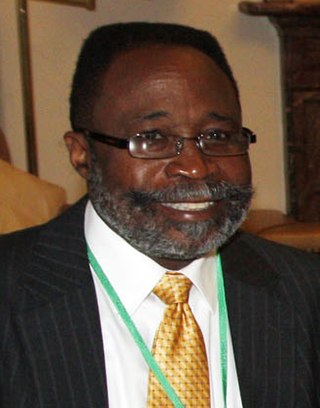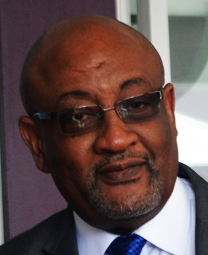
His Majesty's Government of the Virgin Islands is the democratically elected government of the British Overseas Territory of the British Virgin Islands. It is regulated by the Constitution of the British Virgin Islands.

Daniel Orlando Smith, OBE is a British Virgin Islands politician and the former Premier of the British Virgin Islands from 2011 to 2019 and from 2003 to 2007. He also formerly served as Chief Minister of the British Virgin Islands from 2003 to 2007. He first won the office when his National Democratic Party won the 2003 general election, being the party's first victory at a general election in its history.
The Virgin Islands Party (VIP) is a political party in the British Virgin Islands. It is presently led by Natalio Wheatley. It is the oldest active political party in the British Virgin Islands, and it has won seven general elections, more than any other political party in the British Virgin Islands.
Cyril Brandtford Romney was a British Virgin Islander politician who served as Chief Minister of the British Virgin Islands from 1983 to 1986. He also served as a member of the Legislative Council of the British Virgin Islands from 1979 to 1995. He was the first British Virgin Islander to hold the post of Financial Secretary, and was also a business leader in the Territory and the region.
The United Party was a political party of the British Virgin Islands.
General elections were held in the British Virgin Islands on 20 August 2007. The result was a landslide victory for the opposition Virgin Islands Party (VIP) over the incumbent National Democratic Party (NDP).
General elections were held in the British Virgin Islands on 17 May 1999. The result was a victory for the incumbent Virgin Islands Party (VIP) led by Chief Minister Ralph T. O'Neal over the newly formed National Democratic Party (NDP) led by Orlando Smith.

Politics of the British Virgin Islands takes place in a framework of a parliamentary representative democratic dependency, whereby the Premier is the head of government, and of a multi-party system. The British Virgin Islands are an internally self-governing overseas territory of the United Kingdom. The United Nations Committee on Decolonization includes the islands on the United Nations list of non-self-governing territories. The Constitution of the Islands was introduced in 1971 and amended in 1979, 1982, 1991, 1994, 2000 and 2007. Executive power is exercised by the government. Legislative power is vested in both the government and the House of Assembly. The Judiciary is independent of the executive and the legislature. Military defence is the responsibility of the United Kingdom.
General elections were held in the British Virgin Islands on 20 February 1995. The result was a victory for the incumbent Virgin Islands Party (VIP) led by Chief Minister Lavity Stoutt. The VIP won a plurality of six seats, and thus were able to form a minority government as no other party or coalition could muster a larger number of seats. The BVI United Party (UP) won three seats, and the Concerned Citizens Movement (CCM) won two seats. The two other seats were won by independents. Shortly after the election Alvin Christopher joined the VIP upon being offered a Ministerial seat, giving the VIP an outright majority.
Snap general elections were held in the British Virgin Islands on 17 November 1986. The result was a victory for the Virgin Islands Party (VIP) led by Chief Minister Lavity Stoutt over the United Party (UP). Subsequent to the election, Ralph T. O'Neal became leader of the opposition despite not being head of the UP.
General elections were held in the British Virgin Islands on 11 November 1983. The result was a victory for the opposition United Party in coalition with independent candidate Cyril Romney over the governing Virgin Islands Party (VIP) led by former Chief Minister Lavity Stoutt. Each major party won four seats, and Cyril Romney was the sole remaining elected independent. Accordingly, Romney allegedly agree to join a coalition with whichever party would make him Chief Minister. The VIP declined to do so, but the UP eventually agreed thereby winning the election despite securing a smaller overall percentage of the vote.
General elections were held in the British Virgin Islands on 12 November 1979. The result was a victory for the opposition Virgin Islands Party (VIP) led by former Chief Minister Lavity Stoutt over the incumbent United Party (UP) led by Willard Wheatley. The newly formed Virgin Islands National Movement (VINM), led by Elvin Stoutt, also contested the elections but did not win any seats.
General elections were held in the British Virgin Islands on 1 September 1975. The result was one of the most confused in the Territory's history, but is officially recorded as a victory for the United Party led by Willard Wheatley over the opposition Virgin Islands Party (VIP) led by former Chief Minister Lavity Stoutt.

Julian Fraser is a British Virgin Islander politician who formerly belonged to the opposition Virgin Islands Party in the British Virgin Islands, and in August 2018 formed a new party, Progressives United.
General elections were held in the British Virgin Islands on 14 April 1967. The election was the first general election after the passing of the new Constitution earlier in the same year, which introduced Ministerial Government into the British Virgin Islands for the first time. Elections under the prior Constitution introduced in 1950 to restore the Legislative Council had merely elected legislators. It is probably fair to say that 1967 marked the introduction of true direct democratic rule in the British Virgin Islands. But, notwithstanding the introduction of Ministerial Government, the resulting Legislative Council is still referred to as the 6th Legislative Council in deference to the five prior Councils elected under the 1950 Constitution.
Conrad Antonio Maduro is a British Virgin Islander politician and longtime leader of the United Party. Remarkably, Conrad Maduro has led his party to victory at three different general elections, but has never been appointed Chief Minister.
Dr Qwominer William Osborne, OBE was a British Virgin Islander politician and physician.

The Leader of the Opposition is the leader of the largest political party in the House of Assembly that is not in government.

General elections were held in the British Virgin Islands on 25 February 2019. For the first time, four parties with at least one incumbent member were contesting an election.

Andrew Alturo Fahie is a British Virgin Islands politician who served as Premier of the British Virgin Islands from 2019 to 2022. He was also the chairman of the Virgin Islands Party in the British Virgin Islands from 2016 to 2022. He was convicted of a range of charges relating to conspiracy to import cocaine into the United States in 2024.















